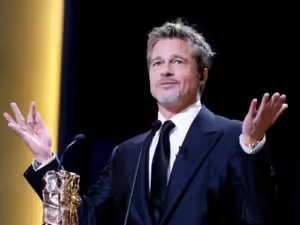
Jerry Seinfeld, the co-creator and star of the legendary sitcom “Seinfeld”, has always been vocal about defending his show against criticism.
As one of the highest-rated sitcoms in television history, “Seinfeld” has left a lasting impact on comedy.
Despite its success, the show has faced its share of criticism over the years.
In this blog post, we will explore some of the most notable moments when Seinfeld stood up for his creation, showcasing his wit and passion for the show.
The Legacy of “Seinfeld”
“Seinfeld,” often described as a “show about nothing,” aired from 1989 to 1998 and featured a talented cast, including Julia Louis-Dreyfus, Jason Alexander, and Michael Richards.
The show cleverly blended humor with the mundane aspects of everyday life, resonating with audiences worldwide.
Its unique format and groundbreaking storytelling techniques have influenced countless comedies that followed.
Defending Against Criticism
WFAN Radio Show, November 2024
In November 2024, Jerry Seinfeld made headlines when he called into a sports radio show, WFAN, after host Chris McMonigle jokingly claimed that “Seinfeld” had only a few good episodes.
Seinfeld’s response was both humorous and revealing.
He stated, “I’m not arrogant enough to think that everybody should like what I do. I just wanted to let you know it doesn’t bother me.”
This moment showcased Seinfeld’s self-awareness and confidence in his work.
He humorously compared the show’s episode count to the performance of the NFL’s New York Giants, saying, “We made 180 episodes. Three good ones. We’re like the Giants.”
This witty comeback not only defended the show but also highlighted Seinfeld’s ability to laugh at himself and the industry.
The New Yorker Interview, April 2024
In an April 2024 interview with The New Yorker, Seinfeld addressed the changing landscape of comedy and how certain jokes from the 90s might not be acceptable today.
He referenced a controversial episode where his character, Kramer, proposed a business idea involving homeless people pulling rickshaws.
Seinfeld acknowledged that such humor would not fly in 2024, stating, “Do you think I could get that episode on the air today? … We would write a different joke with Kramer and the rickshaw today.”
This reflection showed Seinfeld’s understanding of the evolving nature of comedy.
While he defended the humor of his past work, he also recognized the importance of adapting to contemporary sensibilities.
This balance of nostalgia and awareness is a testament to his thoughtful approach to comedy.
Reddit AMA, 2014
During a Reddit AMA (Ask Me Anything) session in 2014, Seinfeld was asked about the polarizing finale of his show, which left many fans divided.
In his response, he expressed satisfaction with how the series concluded, emphasizing that the finale was a tribute to the cast and crew who contributed to the show’s success.
“I was happy with the Seinfeld finale because we didn’t want to do another episode as much as we wanted to have everybody come back to the show we had so much fun with,” he explained.
Seinfeld’s defense of the finale highlighted his appreciation for the collaborative effort behind the show.
Instead of focusing on the mixed reactions from fans, he chose to celebrate the journey and the relationships built during the show’s run.
This perspective reflects his commitment to the creative process over public opinion.
The Larry King Show, 2007
In a memorable appearance on The Larry King Show in 2007, Seinfeld was taken aback when King suggested that his show had been canceled.
“You’re not aware of this? You think I got canceled? I thought that was pretty well documented,” he replied incredulously.
Seinfeld clarified that he had chosen to end the show when it was still at the peak of its popularity, boasting about the 75 million viewers who tuned in for the finale.
This exchange emphasized Seinfeld’s pride in his work and his status in the entertainment industry.
His assertion, “Do you know who I am?” became a famous line, encapsulating his confidence and the show’s monumental success.
Seinfeld’s ability to assert his legacy while addressing misconceptions about his career is a powerful reminder of his impact on television.
Exploring the Key Themes of “Seinfeld”: A Deep Dive into the Show About Nothing
“Seinfeld,” created by Jerry Seinfeld and Larry David, is often celebrated as one of the greatest sitcoms of all time.
Running from 1989 to 1998, this show captivated audiences with its unique blend of humor, relatable characters, and sharp wit.
While some may label it as a “show about nothing,” “Seinfeld” actually delves into several profound themes that resonate with viewers across generations.
In this blog post, we will explore the key themes that make “Seinfeld” a timeless classic, examining what these themes reveal about life and society.
The Absurdity of Everyday Life
Finding Humor in the Mundane
One of the most significant themes in “Seinfeld” is the absurdity of everyday life.
The show masterfully transforms ordinary, relatable experiences into comedic gold.
From waiting in line at a coffee shop to navigating social norms, the characters find themselves in hilariously awkward situations.
For example, the famous “Festivus” episode introduces the idea of a holiday that celebrates the ridiculousness of family gatherings, highlighting how bizarre real-life scenarios can be.
This focus on the mundane allows viewers to laugh at their own lives, reminding us that humor can be found in even the most ordinary moments.
Social Commentary
“Seinfeld” also serves as a subtle commentary on societal norms and expectations.
Through its characters, the show questions the importance we place on trivial matters, such as dating etiquette or the best way to dispose of food in a restaurant.
In one iconic episode, George Costanza famously declares, “It’s not a lie if you believe it,” illustrating how individuals often justify their actions based on personal perceptions.
This theme encourages viewers to reflect on the absurdities of social etiquette while also poking fun at societal norms.
Friendship and Relationships
The Complexities of Friendships
Another crucial theme in “Seinfeld” is the exploration of friendship.
The show depicts a group of friends—Jerry, George, Elaine, and Kramer—navigating life together, showcasing the ups and downs of their relationships.
While their friendships are filled with humor, they often reveal the complexity of human connections.
For instance, George’s constant neuroses and Elaine’s strong-willed personality create comedic tension, but their loyalty to each other shines through in difficult times.
This theme resonates with audiences who may recognize similar dynamics within their own friendships.
Romantic Relationships
“Seinfeld” also dives into the intricacies of romantic relationships, often with a humorous twist.
The characters’ romantic escapades highlight the challenges and absurdities of dating in a modern world.
For example, Jerry’s neurotic tendencies and George’s constant self-sabotage provide rich material for comedy while also showcasing the realities of modern relationships.
In one episode, Jerry finds himself dating a woman who looks exactly like his ex-girlfriend, leading to humorous complications and an exploration of his inability to move on.
This theme reflects the complexities of love, showcasing the humor that often accompanies dating and relationships.
The Mundane vs. the Profound
Everyday Conversations
“Seinfeld” is famous for its “show about nothing” concept, but much of the humor arises from profound, insightful conversations about seemingly trivial matters.
The characters engage in discussions that, on the surface, seem mundane but often lead to deeper truths about life.
In various episodes, they debate topics like the best way to eat a bagel or the rules of public restrooms, prompting viewers to join in on the absurdity.
These conversations encourage audiences to consider the significance of everyday moments, illustrating how the mundane can sometimes hold profound meaning.
Existential Questions
The show also touches on existential questions, prompting viewers to reflect on their own lives.
For instance, in one memorable scene, Jerry contemplates whether he should be concerned that he has no significant achievements.
These moments invite the audience to consider their own experiences and the impact of their daily choices.
By examining the tension between the mundane and the profound, “Seinfeld” encourages a deeper understanding of the human experience.
Critique of Modern Life
Satire of Consumer Culture
“Seinfeld” doesn’t shy away from critiquing modern life, particularly consumer culture.
The characters often engage in absurd behavior centered around materialism and status, showcasing the ridiculousness of their priorities.
For example, Jerry’s obsession with being the “master of his domain” when it comes to abstaining from sex highlights society’s often misguided focus on physical gratification.
Through humor, the show critiques how consumerism and societal expectations shape individual lives.
The Futility of Social Norms
One of the most striking critiques in “Seinfeld” is the futility of social norms and conventions.
Many plotlines revolve around the characters challenging societal expectations and behaving in ways that defy convention.
The show poses questions about the importance of social acceptance, provoking viewers to think critically about their own adherence to societal norms.
For instance, Elaine’s boldness in rejecting traditional femininity and George’s unapologetic selfishness allows the show to explore themes of individuality and nonconformity.
The Lasting Influence of “Seinfeld” on Modern Sitcoms
“Seinfeld,” often referred to as the “show about nothing,” has had a profound impact on the landscape of television comedy since its debut in 1989.
Creating a new comedic paradigm, the series redefined what a sitcom could be through its innovative narrative style, character complexity, and unique brand of humor.
In this blog post, we will explore how “Seinfeld” has influenced modern sitcoms, examining its lasting legacy, contributions to television comedy, and the ways in which contemporary shows have adopted its groundbreaking techniques.
Defining the “Show About Nothing”
A New Narrative Style
One of the most notable aspects of “Seinfeld” is its departure from traditional sitcom storytelling.
Unlike previous sitcoms that often relied on a central plot or moral lesson, “Seinfeld” embraced a narrative style centered around the everyday lives of its characters.
The show presented plotlines that frequently overlapped and lacked a definitive resolution, which allowed for a more realistic portrayal of daily life.
Modern sitcoms such as “It’s Always Sunny in Philadelphia” and “Parks and Recreation” have adopted a similar approach, focusing on absurd and comedic situations rather than linear storytelling.
This shift has allowed for greater freedom in storytelling and character development, setting the stage for more varied and unconventional narratives.
The Importance of Character Dynamics
“Seinfeld” is also renowned for its rich character development and dynamics.
The central cast—Jerry, George, Elaine, and Kramer—each exhibited distinct personalities, flaws, and quirks, which drove the humor and storylines of the show.
This focus on character-driven comedy has influenced many modern sitcoms, as seen in shows like “Brooklyn Nine-Nine” and “The Good Place”.
These series have similar ensemble casts that not only entertain but also create meaningful connections with audiences through their relatable struggles and triumphs.
By emphasizing character complexity, “Seinfeld” paved the way for deeper and more impactful storytelling in modern comedies.
Humor That Challenges Boundaries
Observational Comedy
“Seinfeld” popularized observational humor, where characters comment on the absurdities of everyday life.
This style of comedy stems from Jerry Seinfeld’s stand-up background, allowing the show to delve into relatable topics with sharp wit and biting humor.
Modern sitcoms like “The Office” and “New Girl” have incorporated observational comedy to great effect.
By emphasizing humorous insights into mundane situations, these shows engage audiences in a way that feels both familiar and fresh.
“Seinfeld’s” influence on observational humor has also impacted other genres, making it a staple of comedic storytelling across various mediums.
Absurdism and Irony
Another significant aspect of “Seinfeld’s” humor is its embrace of absurdism and irony.
The show’s plots often included bizarre situations and unexpected twists, challenging characters’ perceptions of reality and social norms.
For example, episodes like “The Contest” and “The Soup Nazi” showcase absurd scenarios that become the foundation for humor.
This embrace of irony and surreal situations has inspired modern sitcoms to push comedic boundaries.
Shows like “Rick and Morty” and “Community” utilize absurd characters and plots, reflecting the influence of “Seinfeld” while carving their own unique paths in the comedy genre.
Cultural Commentary and Social Dynamics
Prevalence of Social Commentary
“Seinfeld” is known for its sharp cultural commentary, often addressing topics relevant to its audience.
Through humor, the show tackled various social issues, including relationships, consumerism, and societal quirks.
For example, the show’s exploration of dating culture and the complexities of friendships resonated with viewers, illustrating the challenges of navigating modern social dynamics.
Modern comedies like “Master of None” and “Schitt’s Creek” have taken a page from this book, using humor to explore contemporary cultural issues such as race, identity, and family dynamics.
By addressing these topics through comedy, these shows maintain the relevance and relatability that “Seinfeld” established decades ago.
Embracing the Anti-Hero
Additionally, “Seinfeld” introduced audiences to the anti-hero archetype.
The characters in the show—particularly George and Jerry—are often selfish, neurotic, and morally ambiguous.
This departure from traditional heroic characters changed the way sitcom protagonists are perceived.
Shows like “Curb Your Enthusiasm”, created by Larry David, and “Barry” follow this trend, crafting lead characters who are flawed yet relatable.
By embracing the anti-hero concept, these sitcoms create a different kind of engagement with the audience, allowing them to root for and against characters simultaneously.
Legacy and Impact
Inspiration for Future Generations
“Seinfeld’s” influence can be seen in numerous modern sitcoms, as the series set a new standard for television comedy.
Many creators and writers cite “Seinfeld” as a major influence in their own works, incorporating elements of its unique storytelling and humor.
For instance, the series have inspired creators like Mike Schur, who produced “Parks and Recreation” and “Brooklyn Nine-Nine,” showcasing the impact of “Seinfeld” on the current generation of writers and comedians.
By blending humor with relatable characters and absurd situations, these shows build upon the foundation established by “Seinfeld.”
The lasting legacy of “Seinfeld” continues to shape the future of sitcoms, proving its relevance and influence in modern comedy.



















